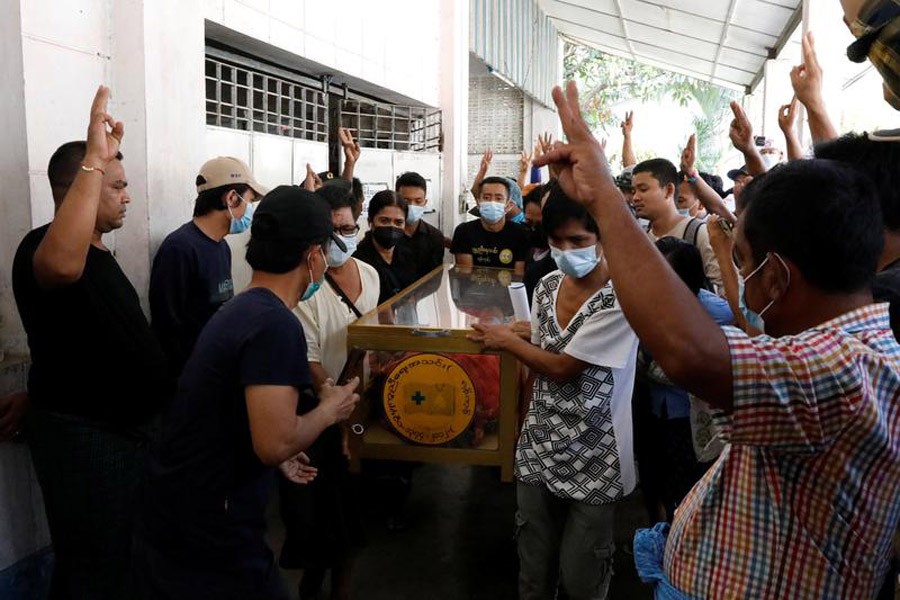Myanmar security forces shot dead at least 20 pro-democracy protesters on Monday, an activist group said, and the military junta imposed martial law in parts of the main city Yangon, giving commanders wide powers to stamp out dissent.
Supporters of detained elected leader Aung San Suu Kyi took to the streets again despite the killing of dozens of protesters on Sunday in the bloodiest day since a military coup on Feb. 1 ignited mass demonstrations nationwide, reports Reuters.
Marches took place on Monday in the second city Mandalay and in the central towns of Myingyan and Aunglan, where police opened fire, witnesses and media reported.
“One girl got shot in the head and a boy got shot in the face,” an 18-year-old protester in Myingyan told Reuters by telephone. “I’m now hiding.”
The Assistance Association for Political Prisoners (AAPP) said at least 20 people had been killed on Monday in shootings by security forces. The Myanmar Now media outlet reported protests across the country, including in the Yangon district of Hlaingthaya, the scene of unrest and arson attacks the previous day.
A journalist in Mandalay said one person was shot dead there after a big protest had passed off peacefully.
A junta spokesman did not answer calls requesting comment and Reuters could not independently confirm all the casualties.
The AAPP said 74 people died on Sunday, many of them in demonstrations in Hlaingthaya, a factory area.
In total, 183 people have been killed by security forces in the weeks of protests against the coup and the casualties were drastically increasing, the group said.
In Washington, the US State Department said the military’s violence against protesters was “immoral and indefensible”.
United Nations Secretary-General Antonio Guterres urged the Myanmar military to allow a visit by his special envoy to help calm the situation and set the stage for dialogue and a return to democracy.
“The killing of demonstrators, arbitrary arrests and the reported torture of prisoners violate fundamental human rights and stand in clear defiance of calls by the Security Council for restraint, dialogue and a return to Myanmar’s democratic path,” his spokesman, Stephane Dujarric, said.
MARTIAL LAW
Myanmar state broadcaster MRTV said martial law had been imposed in several districts of Yangon, the country’s commercial hub and former capital. Myanmar Now said it had also been imposed in several parts of Mandalay.
The martial law announcement stated that military commanders in Yangon would take over administration of districts, including the courts, MRTV said.
The courts martial had the authority to hand down the death sentence or long prison terms for a range of offences. These included treason and dissent, obstructing the military or civil service, spreading untrue information, and crimes related to unlawful association.
The army said it took power after its accusations of fraud in a Nov. 8 election won by Suu Kyi’s National League for Democracy (NLD) were rejected by the electoral commission. It has promised to hold a new election, but has not set a date.
The military has ruled Myanmar for most of the years since independence from Britain in 1948, and cracked down hard on previous uprisings before agreeing to the latest attempt at a transition to democracy, now derailed.
Suu Kyi, 75, has been detained since the coup and faces various charges, including illegally importing walkie-talkie radios and infringing coronavirus protocols. Last week, the junta accused her of accepting illegal payments but she has not yet been charged with that.
The Nobel peace laureate was due to face another virtual court hearing on Monday but her lawyer, Khin Maung Zaw, told Reuters the session could not go ahead because the internet was down. The next hearing will be on March 24, he said.
Western countries have called for Suu Kyi’s release and condemned the violence and Asian neighbours have offered to help resolve the crisis, but Myanmar has a long record of rejecting outside intervention.
CHINESE WORRIES
Arson attacks on Sunday against 32 Chinese-invested factories in Hlaingthaya prompted China’s strongest comments yet on the turmoil gripping its neighbour, where many people see Beijing as supportive of the coup.
China’s Global Times newspaper said “vicious attacks” caused damage worth $37 million and injuries to two Chinese employees. Its embassy urged Myanmar’s generals to stop the violence.
“We wish that Myanmar’s authorities can take further relevant and effective measures to guarantee the security of the lives and assets of Chinese companies and personnel,” foreign ministry spokesman Zhao Lijian said in Beijing.
He did not mention the deaths of the protesters.
Anti-China sentiment has risen since the coup, fuelled by Beijing’s muted criticism of the takeover compared with Western condemnation. But protest leader Thinzar Shunlei Yi said Myanmar people did not hate their Chinese neighbours though their rulers had to understand the outrage felt over their stand.
“Chinese government must stop supporting coup council if they actually care about Sino-Myanmar relations and to protect their businesses,” she said on Twitter.


